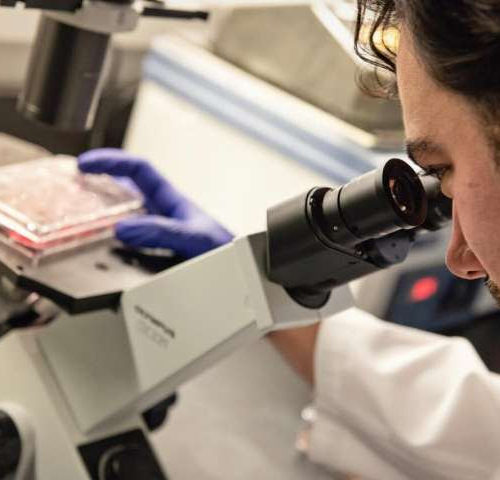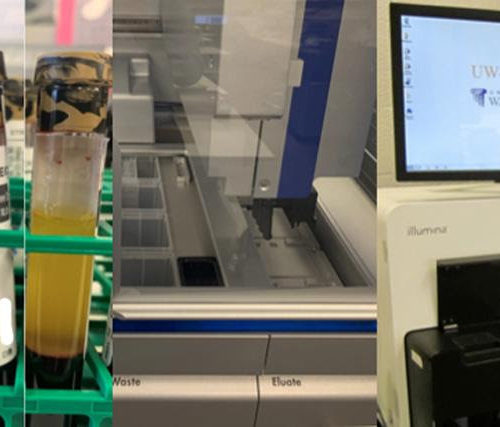UNIVERSITY OF TEXAS M. D. ANDERSON CANCER CENTER In a study to examine a Mediterranean diet in relation to prostate cancer progression in men on active surveillance, researchers from The University of Texas MD Anderson Cancer Center found that men with localized prostate cancer who reported a baseline dietary pattern that more closely follows the key principles...
Tag: <span>Prostate cancer</span>
Inflammation from ADT may cause fatigue in prostate cancer patients
Moffitt Cancer Center study suggests elevation in inflammation marker IL-6 linked to higher levels of fatigue H. LEE MOFFITT CANCER CENTER & RESEARCH INSTITUTE TAMPA, Fla. — Prostate cancer is one of the most common cancers among men in the U.S. For many patients, hormone therapy is a treatment option. This type of therapy, also called androgen...
Prostate cancer regulator plays role in COVID-19, providing a promising treatment lead
by Nicole Fawcett, University of Michigan The Chinnaiyan Lab leveraged its work in prostate cancer to understand how a key protein functions in COVID-19. Credit: University of Michigan Rogel Cancer Center By taking a lesson from prostate cancer, researchers now have a promising lead on a treatment for COVID-19. Two proteins, ACE2 and TMPRSS2, help the coronavirus gain...
Vanished’ or ‘hidden’ prostate cancer? Men with negative biopsies during active surveillance have good outcomes
WOLTERS KLUWER HEALTH November 17, 2020 – Can early-stage prostate cancer “vanish” during follow-up? More likely the cancer is just “hidden”–either way, negative biopsies during active surveillance for prostate cancer are associated with excellent long-term outcomes, reports a study in The Journal of Urology®, an Official Journal of the American Urological Association (AUA). The journal is published in the Lippincott portfolio...
Gene signature predicts whether localized prostate cancer is likely to spread
COLUMBIA UNIVERSITY IRVING MEDICAL CENTER NEW YORK, NY (Nov. 10, 2020)–Researchers have identified a genetic signature in localized prostate cancer that can predict whether the cancer is likely to spread, or metastasize, early in the course of the disease and whether it will respond to anti-androgen therapy, a common treatment for advanced disease. The new...
New drug research for prostate cancer could also fight COVID-19
by Queensland University of Technology Dr. Lisa Philp and Professor Colleen Nelson, from the QUT Faculty of Health’s School of Biomedical Science, are developing drugs to fight advanced prostate cancer that could also prevent and or treat acute respiratory distress syndrome (ARDS). They and their research team, based at the Translational Research Institute, realized their research...
Blood cell mutations confound prostate cancer liquid biopsy
Unrelated mutations, when present in the blood, can lead to false positive results in men with advanced prostate cancer who are undergoing liquid biopsies. Such tests, which look for variants in the cell-free DNA that tumors shed into the blood plasma, help determine suitable treatment options. “You can actually measure what’s happening with a patient’s...
Toward a new staging system for prostate cancer, and why it matters
by An Demsky, University of Michigan Doctors and biostatisticians at the University of Michigan Rogel Cancer Center have led the development and validation of a staging system to better predict outcomes and inform treatment decisions for men diagnosed with non-metastatic prostate cancer. Although it is one of the most common cancers worldwide, prostate cancer remains one...
The benefits of a prostate cancer screening tool
WILEY Multiparametric magnetic resonance imaging of the prostate (mpMRIp) is a promising tool for diagnosing prostate cancer, and prior to its availability, detection relied on clinical exams and prostate specific antigen screening. In a study published in BJU International, investigators found that the availability of mpMRIp in Australia since 2012 has correlated with significantly reduced numbers of...
Prostate cancer: immunotherapy offers hope
MEDICAL UNIVERSITY OF VIENNA IMAGE: PROSTATE CANCER IS THE SECOND MOST FREQUENT CANCER IN MEN WORLDWIDE. (Vienna, 29 September 2020) An antibody for treating advanced prostate cancer improves progression-free survival in patients with metastasised, castration-resistant prostate cancer. This is the finding of the long-term analyses of an international phase 3 clinical trial, recently published in...





